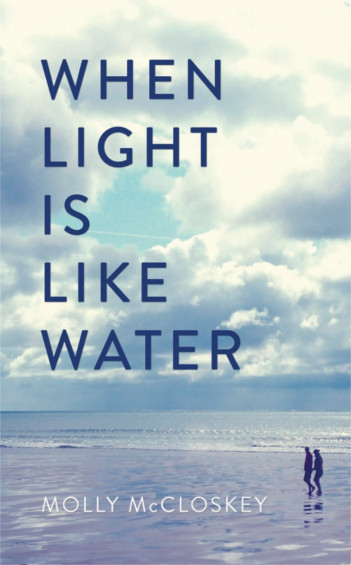Review | When Light is Like Water by Molly McCloskey
When Alice stays in her mother’s condo after her funeral, she is struck by a sense of anticlimax. She cannot fathom how the physical evidence of her mother’s life falls short in representing its reality. All she can do is look at the plates, empty glasses and letters her mother has left behind and fill in the blanks with her own memory. This is the essence of McCloskey’s latest novel, When Light is Like Water; navigating life’s constant ebb and flow of spontaneous possibility sobering bathos, and how our memory compensates for this.
Alice’s first taste of this is during her first summer in Ireland. In her mid-20’s she decides to move to here, aimless and looking for something to settle the vague and persistent feeling of unrest that prevails somewhere deep within her. She spends the summer partying with friends she makes living in Sligo, and soon meets Eddie. He is older, confident and steady; she is everything she’s not, but she feels like he could finally make her feel at ease. Their blissful relationship begins to change once their married. Alice becomes dismayed and panicked when she slowly starts to admit to herself that the elusive unrest hasn’t really gone away. Collapsing into Eddie’s life would be easier, but instead, she begins an affair that challenges how she feels about her future and herself. Once her marriage crumbles and her relationship with Cauley dissipates, she is left with the terrifying realisation that this feeling of unrest, this anticlimax and dispassion can’t be erased by someone else. What’s worse, she begins to gleam that maybe the feeling cannot be erased at all, and we all simply have to live with it.

Divulging so much of the plot will in no way curb the enjoyment of the novel, as the narrator makes it clear from the outset that she’s no longer married to Eddie, and that she had a relationship with Cauley while she was. The book is more of a synthesis of experiences and recollections than a plot-driven novel. The experience of reading the book mimics Alice’s life in Ireland and her relationships with Eddie and Cauley – circular, insular, with the sense of purpose slowly becoming clouded. This sounds like a bad thing, but it works well.The novel is, at its core, one that is trying to capture how memory and experience impact how we live our lives. It begins lively and hopeful, then slows after Alice and Eddie’s marriage. It becomes caught up in itself. Alice’s narration meanders, jumping from memories of her time living in Nairobi, to memories of her mother, to the view outside the house she lives in now. Then begins the recounting of her affair with Cauley, fraught with confusion and anxiety.
Alice isn’t easy to relate to. She isn’t exactly brash or reckless, but there’s a cocky confidence in her that emerges and then retreats, leaving her unable to carry the situation. The way she behaves in public when she’s upset with Eddie or Cauley is childish and cringe-worthy, and her intent on spending the night with someone else, safe in the knowledge she’ll have Eddie to return to once she feels awkward, may be difficult to understand. Then again, maybe it’s not. There are technically two Alices in the novel; the older, present-day narrator Alice, and the young, aimless and unsteady Alice. Alice the narrator can’t always explain the choices young Alice made, which draws attention to the strangeness of recalling the past. There is also a sense of acceptance that narrator Alice passes on to the recounting of her past behaviour. Her acceptance of her past and her descriptions of her darker, seedier thoughts and desires entice our curiosity, and maybe even entice us to admit a solidarity. Alice admits that she saw the world back then as “one big, pathetic fallacy,” which is indicated in her recollections of the sky. Despite these self-centred tendencies in the narrator, McCloskey’s prose deftly communicates the experience of being. We are drawn into Alice’s inner world because it is convincing, and her memories are as compelling to the reader as they are to herself. The use of pathetic fallacy is self reflexive, and strengthens the idea that memories are always tainted by the present and the passage of time.
The novel goes on for longer than you’d expect, particularly since the end of the affair and marriage, the would-be climax of the novel, is brief and slack. After the end of both relationships, Alice’s narrative focus moves back to her mother and to her present, long enough for the prose to fall into a new rhythm. This focus on the present, along with this new steadier, slower pace, marks a significant maturity in Alice the narrator that we were hoping that young Alice would come into. The novel stops rather than ends, with Alice seemingly no better off. She has, however, begun to look to the present and hope for the future, distancing herself from the habit of reliving the past. I was left enchanted, meditative and a little pink and raw from the bracing honesty and precision.

